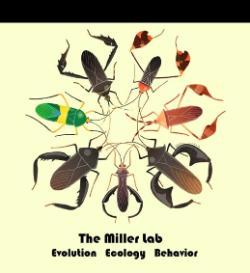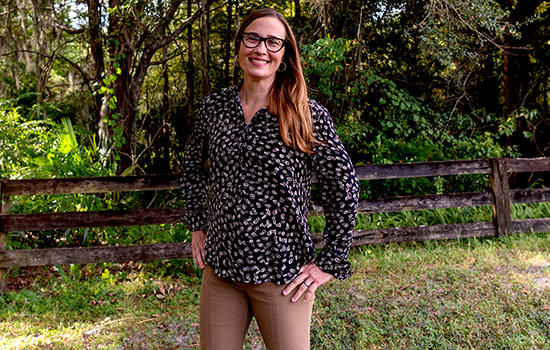Dr. Christine W. Miller
Associate Professor
Evolutionary Ecology & plant-insect interactions
Dr. Miller’s research focuses on better understanding how insects evolve in the context of their natural environment. In 2022 Dr. Miller received a $1.2 million-dollar award from the National Science Foundation (NSF) to investigate how the plants that insects consume affect their exoskeleton and their muscle. This award follows the discovery made by Dr. Miller and her research team that nutrition affects the thickness and injury-resistance of the insect cuticle. Prior to the current NSF award, Dr. Miller received the esteemed National Science Foundation CAREER Award to investigate the evolution of animal weapons. Other honors include a HHMI Mentoring Award, the University of Florida Excellence Award for Assistant Professors, a National Excellence in College and University Teaching Award from the USDA, and she was recognized as a University of Florida Term Professor in 2016 and 2019.
A recent report by the National Academies of Sciences, Engineering, and Mathematics (2019) argues that colleges and universities should take a more intentional, inclusive, and evidence-based approach to training students in STEM, a shift that could retain a broader, more diverse group of students in these fields. Dr. Miller has a long-standing commitment to mentoring excellence. Most recently she has co-facilitated the UF/CALS Faculty Mentor Academy, providing new faculty with semester-long training in mentoring excellence. She also serves as Director of Weaving the Future of Animal Behavior (WFAB) with the goal to promote community and professional development for postdoctoral researchers and early career faculty through workshops, symposia, and long‐term, multi‐level mentoring.
Dr. Miller invests heavily in quality teaching. Her teaching efforts in the past twelve years have focused on Principles of Entomology, and introductory entomology course, and a series of Course-based Undergraduate Research Experience (CURE) courses, often taught alongside her graduate students and postdoctoral researchers. She has helped to direct a campus-wide initiative to bring more CURE courses to the University of Florida, with approximately twenty new courses started in just 2019 and 2020.
-
Research
Plant-feeding insects live in a dynamic world. Seasonal changes in plants can have profound consequences for the shape, size, and behavior of insects. Further, plant invasions provide insects with novel foods – if they can use them. Dr. Miller and her team examine the effects of host plants on weapon biomechanics and trade-offs, context-dependent mate choice, and phenotypic plasticity in feeding morphology. For example, they are examining how seasonal plant environments influence sexual selection, especially male-male competition. With grant funding from the National Science Foundation, they are asking the question of why sexually selected weapons (for example, deer antlers) are often so easily damaged in contests. More generally, they are studying the influence of plant nutrition on the construction and maintenance of a sturdy animal body, ready for combat. They also are actively studying trade-offs between traits involved in sexual selection, including weapons and testes. The incredible insect superfamily Coreoidea, the Leaf-footed bugs and allies, provide great insights to address these and other research questions. Below are three of this team’s major research directions. Visit www.millerlab.net for more.
Plant-insect interactions
Throughout history, animals have encountered novel foods when ranges expand, and niches shift. Today, human activities have resulted in the introduction of countless plants and insects into new contexts. When an insect encounters a novel plant, one of the first challenges is to determine if the plant is edible. If it is, the next step is to figure out how to eat it. Mouthpart morphology can be critical during the process of host shifts. Developmental plasticity in mouthparts may allow animals to tolerate and eventually thrive upon new foods. Using common garden / reciprocal transplant experiments, Dr. Miller’s team have found both evolved differences and pronounced developmental plasticity in the mouthparts of leaf-footed bugs in response to new plants. These changes appear to be adaptive, allowing insects to make the most of novel foods. One question is how such plasticity is maintained, ready to be used. This team uses an integrative approach to understanding insect mouthpart evolution and plasticity, incorporating developmental biology, biomechanics, behavior, and field studies of insect ecology. They also examine the consequences of feeding on seasonally dynamic host plants for the body size, shape, and behaviors of insects.
Dynamic host plants and the biomechanics of animal weapons
A trip to the Rocky Mountains can reveal male elk sparing with their antlers, pronghorn trying to edge out other males, and dung flies competing for mates on bison dung. In fact, any trip to the wilderness easily shows us many examples of male-male competition, or, in some cases, female-female competition over access to mates. People have been fascinated by animal weapons and their fighting behaviors for centuries. In spite of the interest, researchers still do not know why there is such amazing weapon diversity. Why do some species use tusks to fight over females, while others use their legs? Why do even closely related species often have such striking differences in their weapons? And, why when a trait is this important, does it so easily break? Dr. Miller’s team tackle these problems using the striking diversity of weapons in the leaf-footed bugs and their relatives (Superfamily Coreoidea). Working together with David Labonte at Imperial College in London and Walter Federle at the University of Cambridge, they are studying how plant-insect interactions influences weapon construction and diversification. Together with Michael Forthman, former postdoc in the lab, they have reconstructed the phylogeny of these insects so that we can reconstruct weapon evolution. Our research takes Dr. Miller’s team to Panama, Kenya, Swaziland, South Africa, Australia, Singapore, and across the insect-rich state of Florida. This work has been funded by multiple NSF grants, including an NSF CAREER Award.
Trade-offs between weapons and testes
Males in many species use weapons such as horns, antlers, and spurs to compete with other males for access to females. Larger weapons often allow males to win high-quality territories and mating opportunities. However, many of these weapons are costly to produce and maintain, competing for a limited supply of resources within the body. Through experimentation, Dr. Miller’s team have discovered weapons-testes trade-offs in the leaf-footed bugs. Interestingly, such trade-offs are not limited to males; we have found leg-ovary trade-offs in females. The female trade-offs provide insights into the nature of resource allocation within the bodies of individual animals. They are currently expanding their approach to examine the influence of dynamic plant nutrition on trade-offs affecting costly traits across the insect body.
For more on Dr. Miller’s research, see www.millerlab.net
-
Teaching
A major goal of my teaching is to provide a platform for learning that goes beyond the classroom. I encourage students to think and interact critically with the world around them.
I am very interested in developing Classroom-based Undergraduate Research Experience courses (CURE courses) to bring authentic research into the undergraduate classroom. I couple data collection with active content learning to create an exciting atmosphere where students are contributing to publishable research and the scientific body of knowledge.
I also teach the introductory entomology course, ENY 3005/5006 “Principles of Entomology.” Introductory science courses have traditionally relied on lectures and tests that reward memorization of copious facts, an approach that is well known to drive away many talented students. About 30 percent of entering first-year college students plan to pursue degrees in science, mathematics, or engineering, but only 15 percent of degrees are awarded in those fields. “Student centered” or “inquiry based” teaching approaches are known to simultaneously improve student learning and result in higher student retention rates, yet these approaches have been slow to catch on.
Whenever possible, I incorporate active learning in my classroom to ensure that the students grasp and synthesize the material. I make links between their lives and previous classroom experiences and the new material to enhance the learning process. I link small group exercises with lectures and classroom discussions to encourage students apply scientific principles and reasoning to real-world problems and cutting-edge questions. All the while, I encourage students to foster their innate fascination with how the natural world functions.

Contact
2101 Steinmetz Hall
Natural Area Dr.
Gainesville, FL 32611
(352) 273-3917
cwmiller@ufl.edu
-
Education
- Ph.D., Organismal Biology and Ecology, University of Montana, 2007
- B.A., Biology, Wesleyan University, Middletown, CT, 1998
- Miller Laboratory Website:
- Google Scholar Research Publications
-
Recent Honors & Awards
External Awards & Grants
National Science Foundation, Behavioral Systems Program, $1,214,230. 2022- 2026. “Dynamic environments and the biomechanics of animal weapons” PI: Christine W. Miller
National Science Foundation CAREER Award, Behavioral Systems Program, $845,000. 2016-2022. “CAREER: Fighting behavior, performance, and the evolution of shape” PI: Christine W. Miller
USDA National Excellence in Teaching Award, 2017. Awarded at a ceremony in Washington D.C.
United States Department of Agriculture, NIFA, Women and Minorities in Science, Technology, Engineering, and Mathematics Fields Program (WAMS), $90,000. 2016-2018. “Increasing student diversity in food and agriculture-related STEM disciplines through undergraduate classroom-based research experiences” PI: Adam Dale, Co-PIs: Christine Miller & Anne Donnelly.
National Institutes of Health, Maximizing Access to Research Careers (MARC) U-STAR Program, $2,350,594, 2016-2021. “GatorSTAR: A New MARC U*STAR Program at the University of Florida.” PI: David Julian, Co-PIs: Christine Miller, Ryan Duffy, & David Miller.
National Science Foundation, Behavioral Systems Program, $325,394. 2009-2013. “Selection in heterogeneous environments: a multi-trait perspective” PI: Christine W. Miller.
Internal Awards & Grants
UF Term Professorship Award 2017-2020; again 2020-2023. $15,000 each term, total $30,000. Award to recognize and reward UF faculty for outstanding accomplishments.
UF Faculty Enhancement Opportunity Program 2022, $36,345.
University of Florida, College of Agriculture and Life Sciences Undergraduate Teacher of the Year Award 2018.
UF Internationalizing the Curriculum Grant 2018, $5000, support to bring in international course content and active learning activities as part of the Learning Without Borders initiative at UF; UF International Center, Global Fellow Award 2016, $4000; UF International Center, Faculty Grant 2015, $5000.
UF Interdisciplinary Research on Invasive Species Seed Grant 2018-2019, $64,500.
UF Excellence Award for Assistant Professors 2014, $5000. Campus-wide honor.
Leadership
Director of Weaving the Future of Animal Behavior (WFAB). Director of a DEI initiative that sets up diverse early career animal behavior scientists for success in academia. We received funding from the U.S. National Science Foundation, and I have worked closely with the Executive Committee of the Animal Behavior Society to enable institutionalization of this initiative. Director 2022 – present, Member of Leadership Team 2018 – 2022.
College of Agriculture and Life Sciences Faculty Mentor Academy Facilitator, Spring 2022 and Spring 2024. Direct a bi-weekly, semester-long mentor training for 16 - 20 early career faculty members at the University of Florida. This DEI initiative is aimed to foster mentoring excellence to enhance productivity of research groups while fostering career success for early-career members of groups underrepresented in STEM.
Secretary and Division Officer, for the Division of Ecology & Evolution, Society for Integrative and Comparative Biology, 2021 – 2023.
Trained Facilitator for Entering Mentoring Curriculum, Week-long training by the Center for the Improvement of Mentored Experiences in Research (CIMER) Madison, WI. 2021.
LEAD IFAS, Year-long, intensive leadership training by invitation only. Designed to train future academic leaders and administrators. University of Florida/IFAS. 2019.
Co-Director. UF Campus Initiative to boost UF’s national standing into the top 5 public research universities. Together with the Director of the Center for Undergraduate Research and a skilled postdoctoral associate, we created a new program to recruit 300 of the very top undergraduate students into UF by placing them into a research-intensive degree program that include dozens of Course-based Undergraduate Research Experience (CURE) courses that we newly formulated across the university. This program was run in partnership and funding from the UF Provost’s office. 2018 – 2020.

